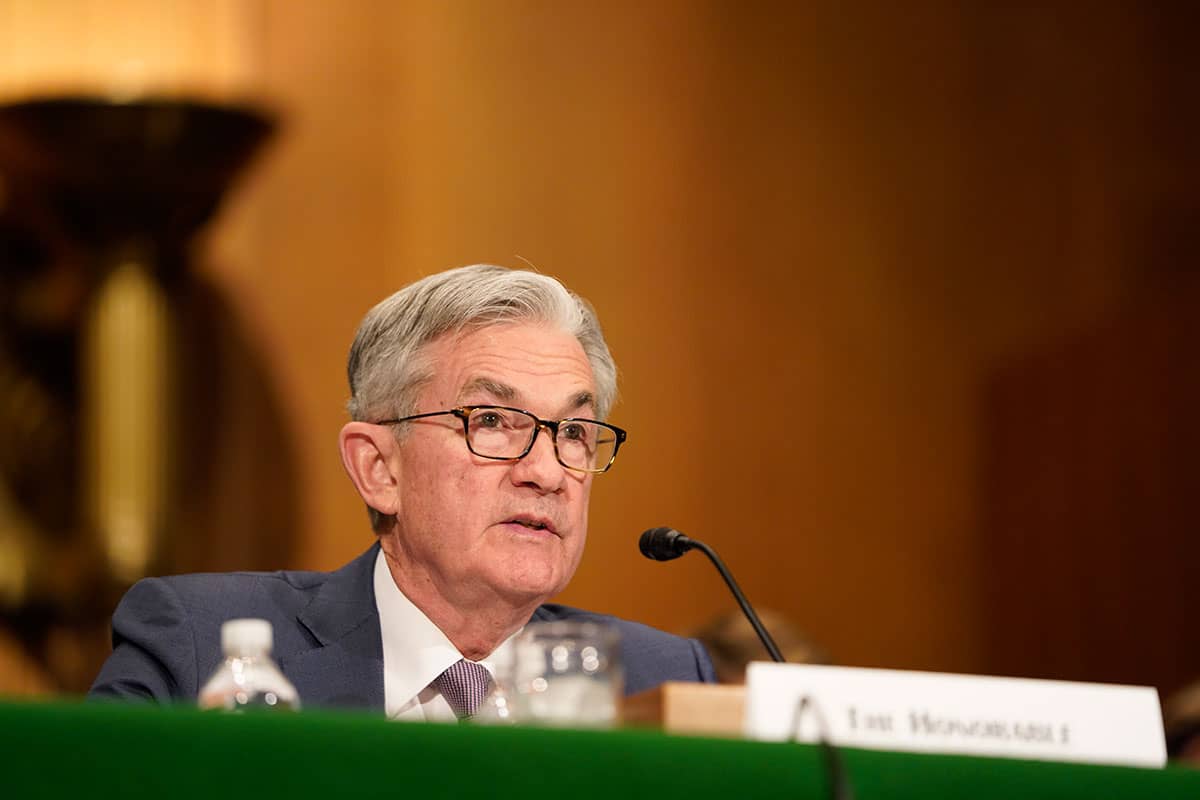Euro-Dollar Rate Softens Ahead of Key Powell Appearance
- Powell due before Congress
- Investors to focus on his tone
- Aussie slides after cautious RBA rate hike
- Yen ignores softer data
- Stock markets little changed ahead of Fed signals and U.S. payrolls

Above: Federal Reserve Chairman Jerome Powell. Image © Federal Reserve.
The spotlight today will fall on Fed Chairman Powell, who will testify before the Senate Banking Committee at 15:00 GMT.
Investors usually pay more attention to the Q&A session with lawmakers, where the Fed chief will face a grilling on the outlook for inflation and interest rates.
Following a streak of encouraging data releases recently that highlighted the resilience of the US economy, several Fed officials stressed that interest rates could be raised beyond the 5.1% point they projected back in December.
Market pricing currently implies rates will peak around 5.4% and the big question is whether Powell will endorse this view.
Considering just how strong the economic data pulse has been lately, with services inflation staying persistently high and the labour market still firing on all cylinders, it seems likely the Fed chief will strike a similarly hawkish tone to his colleagues.
Another topic that could spark fireworks in the markets is the balance sheet, as the Fed’s prepared report said the pace of quantitative tightening could be adjusted if needed.
The dollar would likely benefit from any hawkish remarks, especially on the balance sheet, although the currency’s broader trajectory will depend mostly on the upcoming nonfarm payrolls data on Friday and next week’s inflation report.
Compare EUR to USD Exchange Rates
Find out how much you could save on your euro to US dollar transfer
Potential saving vs high street banks:
$2,750.00
Free • No obligation • Takes 2 minutes
Australian Dollar Hampered by RBA
Over in Australia, the Reserve Bank raised rates by 25 basis points today as expected but the underlying message was quite cautious, putting the emphasis purely on incoming data to determine how much further rates will rise.
The RBA said the full effect of its existing rate increases hasn’t been fully felt in mortgages yet, hinting at the vulnerabilities in the nation’s housing market and essentially preaching caution.
Traders interpreted this shift in language as opening the door for a pause in the tightening cycle, which pushed the Australian dollar lower in the aftermath.
A drop in commodity prices likely exacerbated this selloff, after China played down the prospect of enacting powerful stimulus measures and its trade data for February revealed sharp declines in both exports and imports.
In Japan, the latest wage growth data was disappointing, dealing a heavy blow to speculation that the Bank of Japan will raise its yield ceiling on Friday.
Wages rose only 0.8% in January, a dramatic slowdown from the 4.1% increase in December.
This means real wage growth is now deeply negative, which alongside the latest cooldown in Tokyo inflation metrics, might give the BoJ some pause.
Equity Markets Await Powell
Crossing into the equity realm, Wall Street closed a volatile session virtually unchanged on Monday, with trading being dominated by positioning and hedging flows ahead of Powell’s Congressional address.
While the outcome of today’s session will depend on how markets perceive Powell’s commentary, the ultimate path for stock markets seems to be downhill.
Corporate earnings are contracting, equity valuations are still expensive, and investors can now earn 5% returns in risk-free US government bonds instead of taking chances in riskier plays.
In the geopolitical sphere, the US Senate will unveil a bill today that would allow the White House to ‘respond’ to national security threats posed by companies like TikTok.
There is a sense that the days of TikTok are numbered in the United States, at least in its current form. This notion has fueled a serious rally in shares of its competitors such as Snapchat, which gained 9.5% yesterday.
Marios Hadjikyriacos is Senior Investment Analyst at XM.com. The original article can be viewed here.




